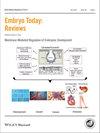Siobhain M. O’ Mahony, Roman M. Stilling, Timothy G. Dinan, John F. Cryan
下载PDF
{"title":"The microbiome and childhood diseases: Focus on brain-gut axis","authors":"Siobhain M. O’ Mahony, Roman M. Stilling, Timothy G. Dinan, John F. Cryan","doi":"10.1002/bdrc.21118","DOIUrl":null,"url":null,"abstract":"<p>Many childhood diseases such as autism spectrum disorders, allergic disease, and obesity are on the increase. Although environmental factors are thought to play a role in this increase. The mechanisms at play are unclear but increasing evidence points to an interaction with the gastrointestinal microbiota as being potentially important. Recently this community of bacteria and perturbation of its colonization in early life has been linked to a number of diseases. Many factors are capable of influencing this colonization and ultimately leading to an altered gut microbiota which is known to affect key systems within the body. The impact of the microbial composition of our gastrointestinal tract on systems outside the gut is also becoming apparent. Here we highlight the factors that are capable of impacting on microbiota colonization in early-life and the developing systems that are affected and finally how this may be involved in the manifestation of childhood diseases. Birth Defects Research (Part C) 105:296–313, 2015. © 2015 Wiley Periodicals, Inc.</p>","PeriodicalId":55352,"journal":{"name":"Birth Defects Research Part C-Embryo Today-Reviews","volume":"105 4","pages":"296-313"},"PeriodicalIF":0.0000,"publicationDate":"2015-12-25","publicationTypes":"Journal Article","fieldsOfStudy":null,"isOpenAccess":false,"openAccessPdf":"https://sci-hub-pdf.com/10.1002/bdrc.21118","citationCount":"45","resultStr":null,"platform":"Semanticscholar","paperid":null,"PeriodicalName":"Birth Defects Research Part C-Embryo Today-Reviews","FirstCategoryId":"1085","ListUrlMain":"https://onlinelibrary.wiley.com/doi/10.1002/bdrc.21118","RegionNum":0,"RegionCategory":null,"ArticlePicture":[],"TitleCN":null,"AbstractTextCN":null,"PMCID":null,"EPubDate":"","PubModel":"","JCR":"Q","JCRName":"Medicine","Score":null,"Total":0}
引用次数: 45
引用
批量引用
Abstract
Many childhood diseases such as autism spectrum disorders, allergic disease, and obesity are on the increase. Although environmental factors are thought to play a role in this increase. The mechanisms at play are unclear but increasing evidence points to an interaction with the gastrointestinal microbiota as being potentially important. Recently this community of bacteria and perturbation of its colonization in early life has been linked to a number of diseases. Many factors are capable of influencing this colonization and ultimately leading to an altered gut microbiota which is known to affect key systems within the body. The impact of the microbial composition of our gastrointestinal tract on systems outside the gut is also becoming apparent. Here we highlight the factors that are capable of impacting on microbiota colonization in early-life and the developing systems that are affected and finally how this may be involved in the manifestation of childhood diseases. Birth Defects Research (Part C) 105:296–313, 2015. © 2015 Wiley Periodicals, Inc.
微生物组与儿童疾病:关注脑-肠轴
许多儿童疾病,如自闭症谱系障碍、过敏性疾病和肥胖正在增加。尽管环境因素被认为在这一增长中发挥了作用。其作用机制尚不清楚,但越来越多的证据表明,与胃肠道微生物群的相互作用可能很重要。最近,这种细菌群落及其在生命早期定植的扰动与许多疾病有关。许多因素都能够影响这种定植,并最终导致肠道微生物群的改变,从而影响体内的关键系统。我们胃肠道的微生物组成对肠道外系统的影响也越来越明显。在这里,我们强调了能够影响生命早期微生物群定植的因素,以及受影响的发育系统,最后,这可能与儿童疾病的表现有关。出生缺陷研究(C辑),2015。©2015 Wiley期刊公司
本文章由计算机程序翻译,如有差异,请以英文原文为准。

 求助内容:
求助内容: 应助结果提醒方式:
应助结果提醒方式:


